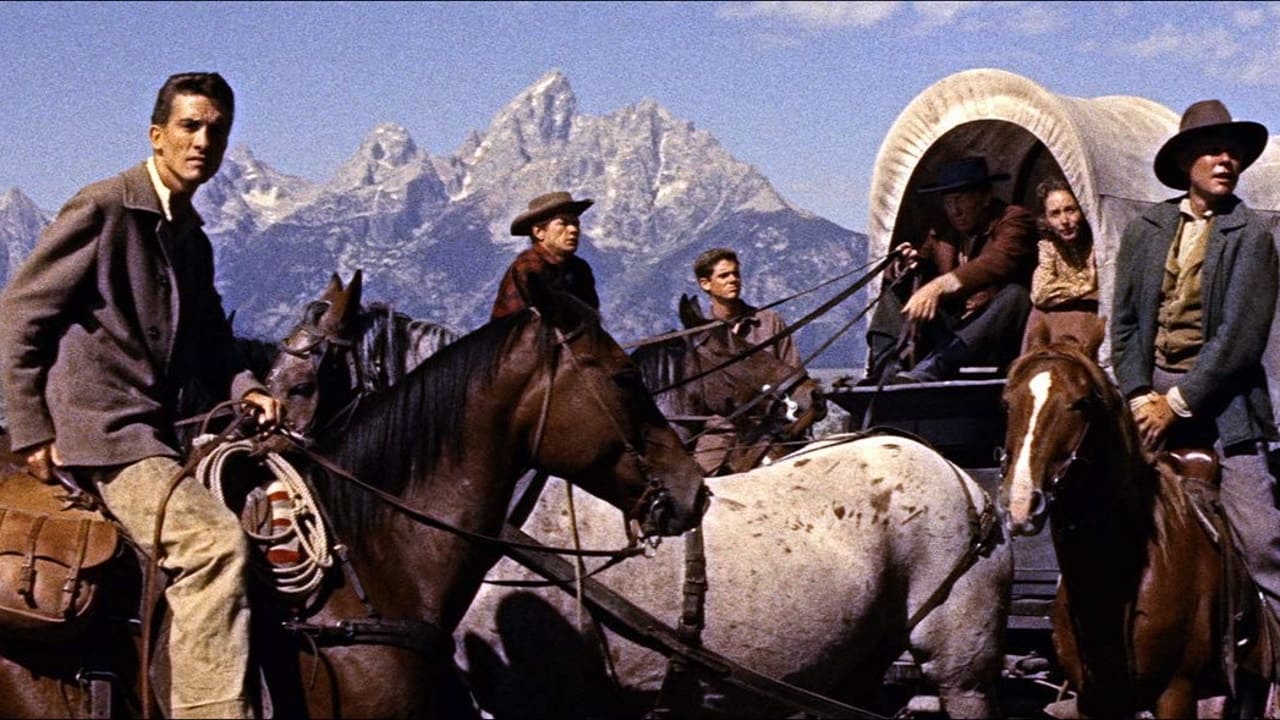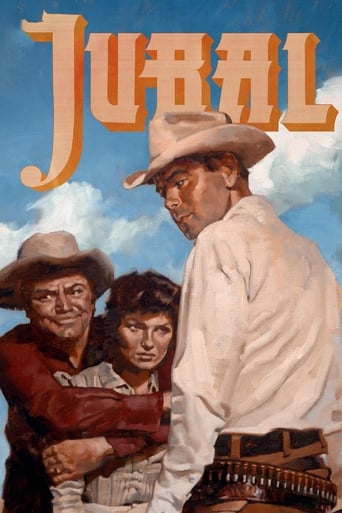

Who payed the critics
... View MoreIt's not great by any means, but it's a pretty good movie that didn't leave me filled with regret for investing time in it.
... View MoreI enjoyed watching this film and would recommend other to give it a try , (as I am) but this movie, although enjoyable to watch due to the better than average acting fails to add anything new to its storyline that is all too familiar to these types of movies.
... View MoreIf you're interested in the topic at hand, you should just watch it and judge yourself because the reviews have gone very biased by people that didn't even watch it and just hate (or love) the creator. I liked it, it was well written, narrated, and directed and it was about a topic that interests me.
... View More"Jubal" paints character, conflict and theme with extremely broad, expressionistic strokes.Women, as symbolized by Mae, are very one-dimensional in this 1956 Western starring Glenn Ford, Rod Steiger, Ernest Borgnine, and Charles Bronson. Men, too, seem shaped as if out of the very prairie, mesa, or arroyo, in which they work as cattle men, which apparently precludes much knowledge of how women think, act, and, especially react.What is true about "Jubal" is that a woman in love who is not only neglected but, moreover, treated like a possession and taken for granted, will respond with sorrow, then fury and then betrayal. That sounds like a very sexist statement to make in 2013, but in the world of the mid-1950s, Hollywood has very rigid ways of depicting men, women, and minorities.Shakespeare knew that there is a sort of invisible pecking order in the military, and on the range. Men must trust each other or what they see as order will crumble, disintegrate. A woman alone, unable to run away, unable to fight back on the same level ground as a man, must resort to what used to be called feminine wiles.The fact that even when I graduated from high school in 1963, the top three likely professions for women consisted of (a) teaching (b) nursing and (c) secretarial. To watch "Jubal" now is a very saddening experience.Shakespeare's Iago manufactured jealousy out of circumstantial evidence, and he does so by playing to each victim's weaknesses and their trust, appealing to their irrational fears, and their ignorance of the truth combined with the unknown, upon which Pinky is able to capitalize in this story.There is much straight-line, point-to-point male and female thinking in this story, but Pinky is the glue that makes this ugly jigsaw puzzle materialize. The first clue of that truism is the unthinking labeling and wrath that almost erupts when the cattle men deduce, by fragrance alone, that Jubal is a sheep man, which turns out not to be true, but it demonstrates how dangerous, how deadly, how fatal misunderstanding, false belief can truly become in action.We may never know, but history's patterns teach us, that a demagogue preys upon the gullibility of the innocent, the naive, and the too-trusting.Without the spurs, and the saddles and the range wars over sheep versus cattle, the fact reverberates in this fable that innuendo can cripple and kill. Alfred Lord Tennyson insisted that "A half truth is the blackest of lies."
... View MoreA novel called "Jubal Troop" by Paul Wellman was the basis for a fine screenplay by both Russell S.Hughes and director Delmer Daves for the Columbia Pictures' stylish western JUBAL (1956). Produced for the studio by William Fadiman it had all the skill and talent director Daves had injected into previous and future western assignments such as "Broken Arrow" (1950), "The Last Wagon" (1956) and his masterpiece "3 Ten To Yuma"(1957). Photographed by ace cinematographer Charles Lawton Jr. on beautiful locations in Wyoming the imposing Grand Tetons make for some amazing backdrops in many scenes. Seven years later Daves and Lawton would return to the same stunning locations for the spectacularly photographed Warner picture "Spencer's Mountain".JUBAL stars Glenn Ford as Jubal Troop a wandering cowhand who is rescued from near freezing on a mountain trail by passing rancher Shep Horgan (Ernest Borgnine). The rancher takes him back to his spread where he is taken care of and revived. The next day Horgan offers him a job to the chagrin of another cowhand Pinky (Rod Steiger) who has taken an instant dislike to the stranger and even suspects that he could be a sheepherder ("he stinks of sheep dip"). Trouble really begins when Shep's new wife - the flirtatious May (Valerie French) makes a play for the new cowboy. Jubal - being too fond of and grateful to Shep - will have none of it ("you're the boss's wife" he tells her as he walks away from her). But Pinky's hatred and jealously of Jubal sees him plant the lie in Shep's head that his wife is having an affair with the stranger. A furious Shep unwittingly confronts Jubal with a gun in the saloon ("get up Jube or I'll give it to you where you sit") but with the help of his friend (Charles Bronson) Jubal manages to out shoot Shep but regretfully kills him. Pinky now has the reason to round up a posse and go after Jubal who has taken refuge in a pilgrim's wagon train. The picture ends with Pinky beating up May but before she dies she informs the attending doctor (Robert Burton) that it was Pinky's lie that caused all the trouble and not Jubal.Performances are generally good throughout! Ford gives his usual dependable portrait of a likable western hero. Borgnine is good too in a big co-starring role after his Acadamy Award winning performance in "Marty" (1955) and Valeria French is excellent as the alluring and flirty wife. Wasted though is Felicia Farr making her debut in a syrupy and poorly written role as a pilgrim girl who takes a shine to Jubal. (She made up for it the following year when she and Ford were the brief bar-room lovers in Daves' brilliant "3 Ten To Yuma"). But the acting honours in JUBAL has to go to Rod Steiger as the mean-spirited and contemptible Pinky despite the actor's ill-advised use of a dubious southern accent. Others in the cast are likable bit players such as John Dierkes, Noah Beery Jr. and Basil Ruysdael. And holding the whole thing together nicely is the splendid music score by David Raksin. There is an infectious and jaunty main theme heard first over the titles and carried through for the early scenes. Then there is some exciting cues for the chase sequences and tender music plays under the picture's softer moments. The music from JUBAL is one of the composer's better scores.JUBAL is a fine memorable western and a splendid addition to the great classics of the fifties.
... View MoreA stolid Western offering minor interest because it focuses more on love and jealousy than action and violence, Jubal still feels like a long day in the saddle. The acting is generally according to type and nothing more: Glenn Ford is laconic if not emotionally stunted, with eyes that never display any emotion; Ernest Borgnine is better, a bit tamped down from his usual volatile self, though he stills careens from best-buddy to big threat; Valerie French is terrible as the bad Canadian (!) hussy but the role is mostly a device to animate Rod Steiger's jealous Pinky. He's the best character in the movie, but still one dimensional with no arc: bad to the bone from beginning till the end. Ford's eponymous Jubal character actually has a backstory out of Sergio Leone (a mother who wanted him to drown) but he reveals it in an unmotivated scene with Felicia Farr's young Mormon. (As always, the real fault lies with the screenwriter.) More interesting to watch than the characters is the beautiful Jackson Hole scenery, a welcome change from the dusty California backdrop of most oaters.
... View MoreOthello out West. Delmar Daves' great and unjustly neglected western finds Glenn Ford's title character falling prey to ranch-hand Rod Steiger's Iago-like jealously when Ernest Borgnine's Othello-like father figure picks him as his foreman and surrogate son. Throw in the machinations of wife Valerie French who has the hots for Ford and it isn't difficult for Steiger to convince Borgnine that there's something going on.If Shakespeare's play is the blueprint, Daves' film is suitably complex in its own right and if Steiger displays a tendency to chew the scenery as he was wont to do, both Borgnine and Ford are outstanding, with Ford in particular proving something of a revelation. He has a terrific scene with Felicia Farr in which he describes his appalling childhood and how it made him the man he is. It's also magnificently photographed in cinemascope by Charles Lawton Jr; the exterior scenes are often breathtaking while the interiors use the widescreen to superb spatial effect.
... View More